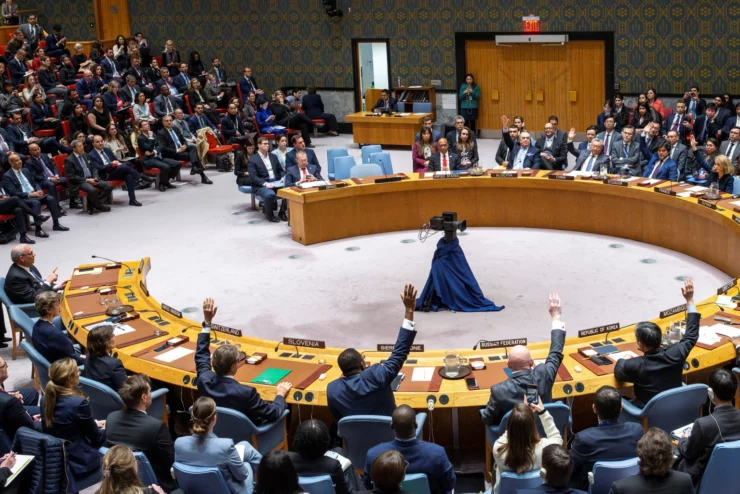
On 18 April, the US vetoed a draft resolution prepared by Algeria proposing to grant full UN membership to the state of Palestine, effectively blocking a Security Council decision to recognise Palestine as a state. Twelve of the fifteen Council members – Slovenia, Sierra Leone, South Korea, Mozambique, Malta, Japan, Guyana, Ecuador, Algeria, as well as Russia, China and France – voted in favour of the resolution, while the UK and Switzerland abstained (Palestine has had observer status at the UN since 2012).
The US representative, speaking at the meeting, argued that Palestine’s full membership in the UN “is a decision to be negotiated between Israel and the Palestinians”.
The American thesis that recognition of a Palestinian state should come through negotiations and not a UN resolution is not open to criticism. After all, the state of Israel itself was created in accordance with UN Resolution 181.
The state of Palestine is officially recognised by 138 countries and the Holy See (Vatican).
In particular, some members of the Security Council stressed that it was the US and its unwavering support for Israel that was responsible for the continuing agony of the Palestinian people. “Today’s use of the veto by the US delegation is a hopeless attempt to stop the inevitable course of history”, said Russian representative Vasily Nebenzya.
Palestinians condemned the US position as blatant aggression against international law.
The results of the vote show that Washington is almost completely isolated. And the US shares responsibility with its Israeli allies for the deaths of tens of thousands of Palestinian civilians. Even UN Secretary-General António Guterres has stressed that the Middle East is on the brink. According to him, seven months of Israeli military operations have created a “humanitarian hell” in Gaza: tens of thousands of people have died, two million Palestinians have suffered death, destruction and denial of life-saving humanitarian aid, and now they face starvation.
According to Ambassador C. Rodrigues-Birkett of Guyana, over decades of Council meetings, the Council has been largely sympathetic to the Palestinian cause, but this sympathy has not generated sufficient political will to achieve a comprehensive, just and lasting solution to the Palestinian question. Instead, she said, “a lot of sticking plasters have been adopted to treat the symptoms” without addressing the “root cause of the problem” – the long delay in establishing an independent state of Palestine.
Algerian Foreign Minister A. Attaf stressed that Palestine’s full membership of the UN was a “historic right” and that denying it would guarantee the prolongation of the Arab-Israeli conflict.
Although this US position has been condemned by virtually the entire international community, Washington intends to significantly increase military aid to Israel, providing more than $14 billion in additional aid.
Meanwhile, many countries in the region are trying to find diplomatic ways to resolve the conflict. In particular, Turkish Foreign Minister H. Fidan recently stated that Hamas is willing to disband its armed wing and continue as a political party following the recognition of a Palestinian state based on the 1967 borders.Against this backdrop, there are growing voices in the United States itself who believe that the civilian suffering in Gaza – tens of thousands of dead, many of them children, hundreds of thousands homeless – puts America on the “wrong” side of history. According to Gallup polls, 55% of Americans now oppose Israel’s actions. Even the pro-Tel Aviv New York Times has editorialised on the need to suspend further arms shipments to Israel.
At a time when the Middle East conflict is taking on a new dimension, with the opening of a new front – the Iranian front – the solidarity of the countries of the Global South can dramatically change the course of international affairs and truly condemn not only Israel’s impunity, but also that of its patrons.
Vladimir MASHIN, PhD in History, political observer, especially for “New Eastern Outlook”